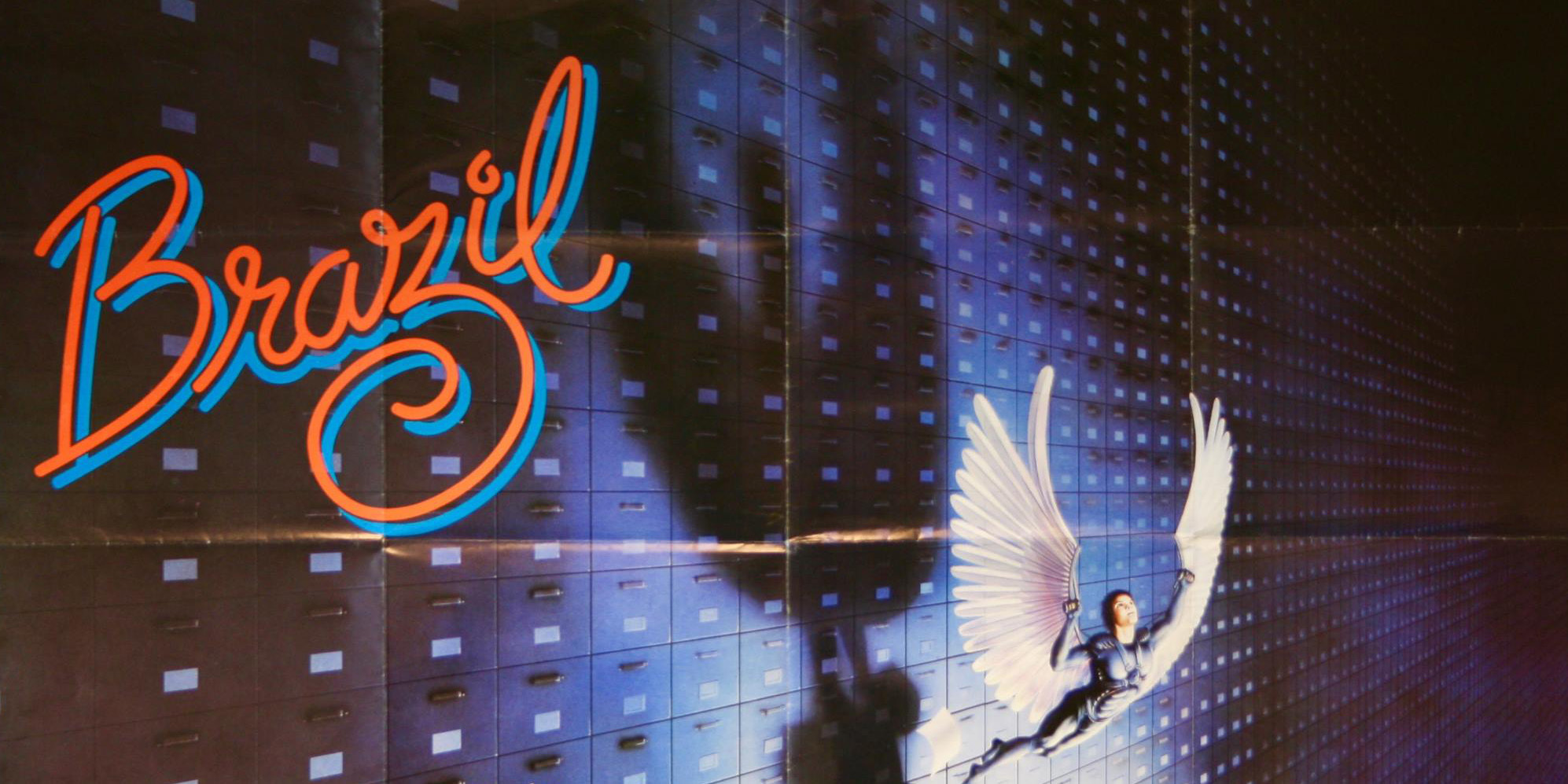
Brazil, one of the most iconic movies of the 80s, is a dystopian masterpiece that takes viewers on a surreal journey through a totalitarian society. Directed by Terry Gilliam, known for his visually stunning and thought-provoking films, Brazil has captivated audiences with its darkly humorous and chilling portrayal of a bureaucratic nightmare.
In this article, we will dive deep into the world of Brazil and explore 38 fascinating facts about the movie. From the film’s troubled production to its enduring legacy, we will uncover the behind-the-scenes stories, interesting trivia, and intriguing details that make Brazil a must-see for both cinephiles and fans of dystopian fiction.
So buckle up and get ready to explore the twisted and captivating universe of Brazil as we unravel the secrets behind this cult classic.
Key Takeaways:
- Brazil, directed by Terry Gilliam, is a dystopian masterpiece with dark humor, stunning visuals, and thought-provoking themes that challenge the status quo and raise questions about freedom and individuality.
- The movie Brazil, released in 1985, remains relevant today with its timeless messages about the dangers of complacency, the impact of societal pressure on the human psyche, and the importance of questioning oppressive systems.
Terry Gilliam’s Masterpiece:
Brazil, directed by Terry Gilliam, is often hailed as a masterpiece of dystopian cinema.
Released in 1985:
The movie was released in 1985 and has garnered a cult following over the years.
A Dystopian Future:
Brazil is set in a dystopian future where a surveillance state controls every aspect of people’s lives.
Influenced by George Orwell:
The film is heavily influenced by George Orwell’s novel “1984,” emphasizing the dangers of a totalitarian society.
A Dark Satire:
Brazil uses dark humor and satire to critique the bureaucratic society and the dehumanizing effects of technology.
Jonathan Pryce as the Protagonist:
Jonathan Pryce delivers a memorable performance as Sam Lowry, a low-level bureaucrat who dreams of escaping reality.
Imaginative Visuals:
The movie is known for its visually stunning and surreal set designs, showcasing Gilliam’s unique imagination.
Stellar Cast:
Brazil features an impressive ensemble cast, including Robert De Niro, Katherine Helmond, and Ian Holm.
Final Cut Controversy:
The film faced controversy due to a dispute over its final cut, with Gilliam’s vision being compromised in its initial release.
Critically Acclaimed:
Brazil received widespread critical acclaim for its intelligent storytelling, dark humor, and thought-provoking themes.
Challenging the Status Quo:
The movie challenges the status quo and raises questions about the nature of freedom and individuality.
Influential Art Direction:
Brazil’s art direction has had a lasting impact on the steampunk genre, inspiring many subsequent films and artworks.
Thrilling Action Sequences:
The film features thrilling action sequences that are seamlessly integrated into the narrative.
Compelling Soundtrack:
The musical score, composed by Michael Kamen, perfectly complements the film’s dark and fantastical atmosphere.
Garnered Multiple Awards:
Brazil was nominated for two Academy Awards and won several awards for its cinematography and production design.
Cult Classic Status:
Over the years, Brazil has gained a loyal fan base and is considered a cult classic among movie enthusiasts.
Thought-Provoking Social Commentary:
The movie serves as a powerful social commentary on the dangers of unchecked government control and the loss of personal freedom.
Surrealistic Dreamscape:
The dream sequences in Brazil create a surreal and chaotic world that reflects the protagonist’s desire for escape.
Imagination vs. Reality:
The film explores the clash between imagination and reality, blurring the lines between fantasy and the grim reality of the dystopian society.
Ambiguous Ending:
Brazil’s ending leaves room for interpretation, allowing viewers to contemplate the true meaning behind the events of the film.
Themes of Love and Rebellion:
Love and rebellion play significant roles in the narrative, showcasing the human spirit’s resilience and desire for freedom.
Predictive of the Future:
Many aspects of Brazil’s dystopian world can be seen as eerily prophetic of the digital age and surveillance society we live in today.
Unconventional Storytelling:
Brazil challenges traditional storytelling structures, immersing viewers in a complex and disorienting narrative experience.
Intertextuality with Literature:
The film references several literary works, including Franz Kafka’s “The Trial” and Charles Dickens’ “Hard Times,” adding depth to its themes and symbolism.
Iconic Images:
Brazil has given rise to numerous iconic and symbolic images that have become synonymous with the film.
Prophetic Technology:
The movie’s portrayal of advanced technology as both a tool of control and a source of liberation resonates with contemporary discussions around privacy and surveillance.
Satirical Commentary on Consumerism:
Brazil satirizes consumerism, presenting a society obsessed with material possessions and mindless entertainment.
Existential Crisis:
The protagonist’s journey in Brazil reflects an existential crisis, grappling with identity, purpose, and the search for meaning in a dehumanizing world.
Metafictional Elements:
The film incorporates metafictional elements, blurring the boundaries between the fictional world and the real world.
Subtle Political Critique:
Brazil subtly critiques political systems and their inherent flaws, urging viewers to question the legitimacy of government authority.
Visual Parallels to German Expressionism:
Brazil draws visual parallels to German Expressionism, with its distorted angles, exaggerated sets, and shadowy lighting.
Influential Cinematography:
The film’s cinematography, crafted by Roger Pratt, contributes to the film’s unique visual aesthetic and enhances the storytelling.
Dark and Absurd Humor:
Brazil uses dark and absurd humor to highlight the absurdity of the bureaucratic nightmare the characters find themselves trapped in.
Cultural Impact:
The film’s themes and imagery have permeated popular culture, inspiring various artistic works and references in movies, TV shows, and music.
Exploration of the Human Psyche:
Brazil delves into the complexities of the human psyche, examining the impact of societal pressure and the struggle for individuality.
Dangers of Complacency:
The movie serves as a reminder of the dangers of complacency and the importance of questioning authority and oppressive systems.
Timeless Relevance:
Despite being released in the 1980s, Brazil’s themes and messages remain relevant in today’s society, making it timeless in its impact.
A Cinematic Triumph:
Brazil stands as a testament to the power of filmmaking, with its bold storytelling, stunning visuals, and thought-provoking commentary.
Conclusion
In conclusion, “Brazil” is a thought-provoking and visually stunning film that has become a cult classic in the world of cinema. With its dystopian setting, intricate storytelling, and stellar performances, the movie continues to captivate audiences decades after its release. Its blend of dark comedy, political satire, and philosophical themes make it a unique and unforgettable viewing experience. From the imaginative sets and costumes to the haunting score, every aspect of “Brazil” contributes to its status as a cinematic masterpiece. Whether you are a fan of science fiction, satire, or simply enjoy thought-provoking films, “Brazil” is definitely worth a watch.
FAQs
1. Who directed the movie “Brazil”?
The movie “Brazil” was directed by Terry Gilliam, known for his visionary style and unique storytelling techniques.
2. When was the movie “Brazil” released?
“Brazil” was released in 1985, gaining critical acclaim for its visual effects, screenplay, and performances.
3. What genre does “Brazil” belong to?
“Brazil” is a dark dystopian film that combines elements of science fiction, political satire, and dark comedy.
4. Who are the main actors in “Brazil”?
The main actors in “Brazil” include Jonathan Pryce, Robert De Niro, Kim Greist, and Katherine Helmond.
5. What is the plot of “Brazil”?
The movie follows the story of Sam Lowry, a low-ranking bureaucrat in a totalitarian society, who becomes embroiled in a dangerous quest to escape his mundane life and find true love.
6. Is “Brazil” based on a book?
No, “Brazil” is an original screenplay written by Terry Gilliam, Charles McKeown, and Tom Stoppard.
7. Was “Brazil” a commercial success?
Although “Brazil” did not perform exceptionally well at the box office upon its release, it has achieved a cult following over the years due to its artistic and philosophical merits.
8. Can “Brazil” be considered a satirical film?
Yes, “Brazil” is widely regarded as a satirical film that critiques bureaucracy, totalitarianism, and the dehumanization of society.
9. What is the significance of the title “Brazil”?
The title “Brazil” represents the recurring theme of escapism and the longing for a better life, as the main character’s fantasies often revolve around the tropical paradise of Brazil.
10. Does “Brazil” have an alternative ending?
Yes, there is an alternative ending to “Brazil” that presents a more optimistic outcome, providing audiences with different interpretations of the movie’s themes.
If you're fascinated by the dystopian world of Brazil, why not explore other captivating works? Dive into the visionary science fiction of I, Robot – Isaac Asimov's groundbreaking collection. Discover more about Brazil's director, Terry Gilliam, and his unique storytelling style. Or, immerse yourself in the absurdist tale of The Trial, a film that critiques the oppressive nature of bureaucracy. Each offers a thought-provoking journey that will leave you pondering the complexities of our world.
Was this page helpful?
Our commitment to delivering trustworthy and engaging content is at the heart of what we do. Each fact on our site is contributed by real users like you, bringing a wealth of diverse insights and information. To ensure the highest standards of accuracy and reliability, our dedicated editors meticulously review each submission. This process guarantees that the facts we share are not only fascinating but also credible. Trust in our commitment to quality and authenticity as you explore and learn with us.


